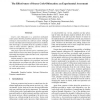Free Online Productivity Tools
i2Speak
i2Symbol
i2OCR
iTex2Img
iWeb2Print
iWeb2Shot
i2Type
iPdf2Split
iPdf2Merge
i2Bopomofo
i2Arabic
i2Style
i2Image
i2PDF
iLatex2Rtf
Sci2ools
112
click to vote
IWPC
2009
IEEE
2009
IEEE
The effectiveness of source code obfuscation: An experimental assessment
Source code obfuscation is a protection mechanism widely used to limit the possibility of malicious reverse engineering or attack activities on a software system. Although several code obfuscation techniques and tools are available, little knowledge is available about the capability of obfuscation to reduce attackers’ efficiency, and the contexts in which such an efficiency may vary. This paper reports the outcome of two controlled experiments meant to measure the ability of subjects to understand and modify decompiled, obfuscated Java code, compared to decompiled, clear code. Results quantify to what extent code obfuscation is able to make attacks more difficult to be performed, and reveal that obfuscation can mitigate the effect of factors that can alter the likelihood of a successful attack, such as the attackers’ skill and experience, or the intrinsic characteristics of the system under attack.
Code Obfuscation | Code Obfuscation Techniques | IWPC 2009 | Software Engineering | Source Code Obfuscation |
Related Content
| Added | 24 May 2010 |
| Updated | 24 May 2010 |
| Type | Conference |
| Year | 2009 |
| Where | IWPC |
| Authors | Mariano Ceccato, Massimiliano Di Penta, Jasvir Nagra, Paolo Falcarin, Filippo Ricca, Marco Torchiano, Paolo Tonella |
Comments (0)

